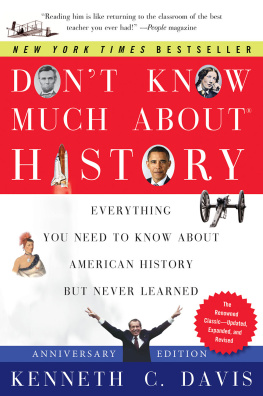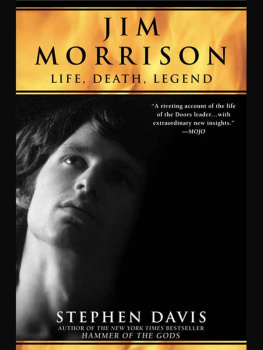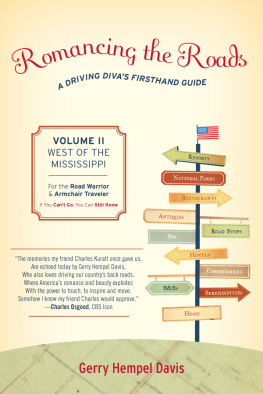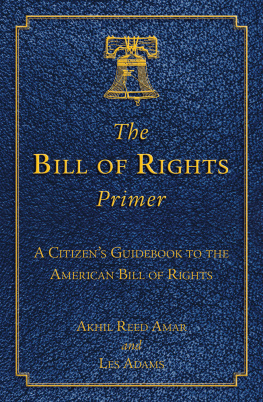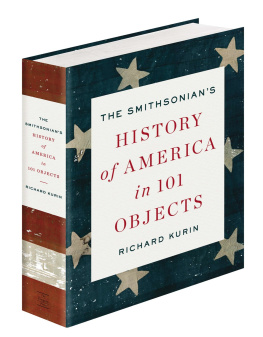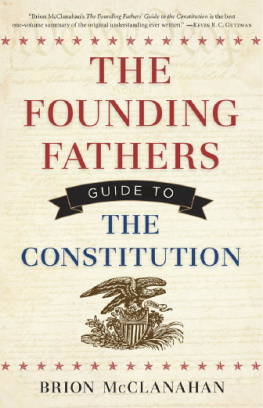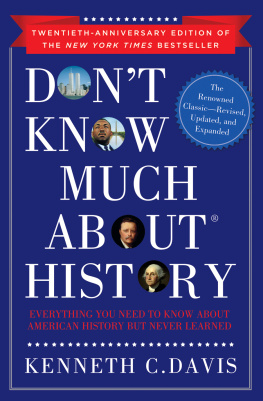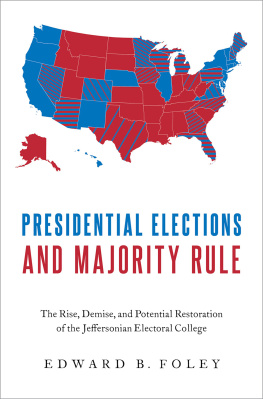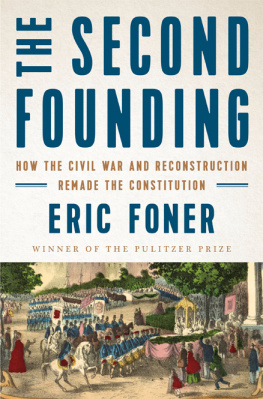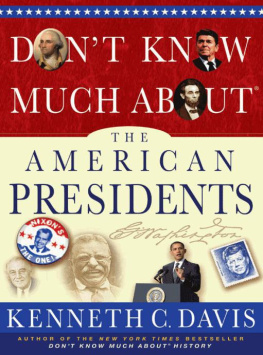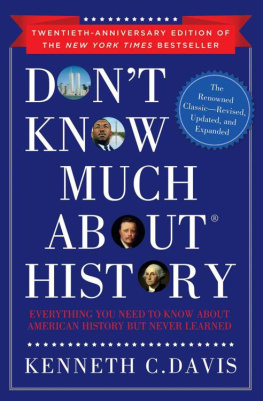DONT KNOW
MUCH ABOUT
HISTORY
ANNIVERSARY EDITION
EVERYTHING
YOU NEED TO KNOW
ABOUT AMERICAN HISTORY
BUT NEVER LEARNED
KENNETH C. DAVIS

To my children, Jenny and Colin
Contents
B ack in the early 1960s, when I was growing up, there was a silly pop song called What Did Washington Say When He Crossed the Delaware? Sung to the tarantella beat of an Italian wedding song, the answer went something like Martha, Martha, therell be no pizza tonight.
Of course, these lyrics were absurd; everybody knew Washington ate only cherry pie.
On that December night in 1776, George might have told himself that this raid on an enemy camp in Trenton, New Jersey, better work. Or else he might be ordering a last meal before the British strung him up. But as the general rallied his ragged, barefoot troops across the icy Delaware, one of his actual comments was far more amusing than those fanciful lyrics. Stepping into his boat, Washingtonthe plainspoken frontiersman, not the marbleized demigodnudged 280-pound General Henry Ox Knox with the tip of his boot and said, Shift that fat ass, Harry. But slowly, or youll swamp the damned boat.
According to Patriots, A. J. Langguths fascinating history of the Revolution, that is how Knox himself reported the story after the war. I certainly never heard that version of the crossing when I was in school. And thats too bad, because it reveals more of Washingtons true, earthy nature than all the hokey tales about cherry trees and nonexistent prayer vigils in Valley Forge. And thats the point of this book: much of what we remember about our history is either mistaken or fabricated. That is, if we remember it at all.
For all too many Americans who dozed through American History 101, the Mayflower Compact might as well be a small car. Reconstruction has something to do with silicone implants. And the Louisiana Purchase means eating out at a Cajun restaurant. When the first edition of this book appeared more than twenty years ago, several writers had just enjoyed remarkable success by lambasting Americans failure to know our past. Americans were shown to be know-nothings in the books Cultural Literacy and The Closing of the American Mind .
Well, were probably not as dumb as those books would have us. But the sad truth is clear: we are no nation of scholars when it comes to history. Just as I was writing the first edition of this book, a highly publicized example of our historical illiteracy appeared. It was a 1987 survey of high school juniors that exposed astonishing gaps in what these seventeen-year-olds knew about American history and literature. A third of the students couldnt identify the Declaration of Independence as the document that marked the formal separation of the thirteen colonies from Great Britain. Only 32 percent of the students surveyed could place the American Civil War in the correct half century.
Sadly, I must say that things have not improved muchif at allin the past twenty years. Every few years, it seems, another survey comes along that blasts the historical ineptness of American students. Part of the problem may be that those juniors who didnt do so well in 1987 may be teachers now!
But why dump on the kids? While there are constant warnings issued about the yawning gaps in the education of American students, another question looms larger. Would most of their parents or older brothers and sisters do any better? Most thirty-seven-year-olds or forty-seven-year-olds might not pass a similar pop quiz. Comedian Jay Leno routinely proves this on Tonight with his Jaywalk segments in which adults demonstrate that they are incapable of answering the simplest questions about history. When Bill Clinton went to Normandy as president for a D-Day observance, even he had to be tutored on what had happened there. So dont ask for whom the gap yawns. The gap yawns for thee.
The reason for these historical shortcomings is simple. For most of us, history was boring, and a great many Americans were taught by a football coach who got dropped into the history class to give him something to fill out his day. Many of us also learned about the past from textbooks that served up the past as if it were a Hollywood costume drama. In schoolbooks of an earlier era, the warts on our Founding Fathers noses were neatly retouched. Slavery also got the glossy makeoverit was merely the misguided practice of the rebellious folks down South until the progressives of the North showed them the light. American Indians were portrayed in textbooks in the same way they were in Hollywood Westerns. Women were pretty much left out of the picture entirely with the exception of a mythical Betsy Ross or a lovely Dolley Madison rescuing the White House china.
Truth isnt so cosmetically perfect. Our historical sense is frequently skewed, skewered, or plain screwed up by myths and misconceptions. Schools that packaged a tidy set of simplistic historical images are largely responsible for fostering these American myths. There has always been a tendency to hide the less savory moments from our past, the way a mad aunts photo gets pulled from the family album.
On top of that, the gaping chasms in our historical literacy have been reinforced by images from pop culture. Unfortunately, highly fictionalized films, such as Oliver Stones JFK or Disneys Pocahontas, or the 2004 release Pearl Harbor make a much greater impression on millions of people than a carefully researched, historically accurate, but numbingly dull documentary. Occasionally there are films like Glory or Saving Private Ryan or Charlie Wilsons War that can stimulate interest in history they way few textbooks or teachers can. Documentary films such as Errol Morriss Oscar-winning The Fog of War: Eleven Lessons from the Life of Robert S. McNamara can illuminate controversies in unique ways. But for the most part, mainstream movies and network television have magnified the myths and makeovers. It is important to understand that looking past these myths is revealing. The real picture is far more interesting than the historical tummy tuck. And truth is always more interesting than propaganda.
Somebody will surely read this and say, So what?
Why bother with history anyway? What difference does it make if our kids know what the Declaration saysor doesnt say? Why does it matter if most people think Watergate is just old news?
The answer is simple because history is really about the consequences of our actionslarge and small. And that has never been more apparent than in the aftermath of the terror attacks of Septem ber 11, 2001. If the terror attacks havent changed anything else, they certainly changed many Americans appreciation of the past and what it has to do with the present.
History explains how we got where we are. We can use it to connect the dots from past to present. Take the Versailles Treaty. (Please!) I know. The very words sound BORING. I can see your eyes grow heavy as you read the words Versailles and Treaty. But consider what that treaty, which supposedly settled World War I back in 1919, actually did. In one very clear and obvious sense, it laid the groundwork for another world war only twenty years later.
But look past that. You can draw a straight line from the Treaty of Versailles to the modern Middle East, Iran and Iraq, the Balkan countries of Europe, and even Vietnam. All these hot spots of the past few decades were created in the aftermath of Versailles, when the European powers carved up the world into colonies that they thought they could rule as they pleased.
When the CIA overthrew the government of Iran in 1953 during the Eisenhower administration, nobody thought about what it might mean in 25 years. At the time, Americans were worried about Russia and the oil companies. What did it matter what the Iranians thought? Restoring the shah to the Iranian throne in place of a government hostile to America seemed like a good idea. Until the Iranian people thought otherwise in 1979 and began the first wave of Islamic revolutions that have altered recent history.
Next page
